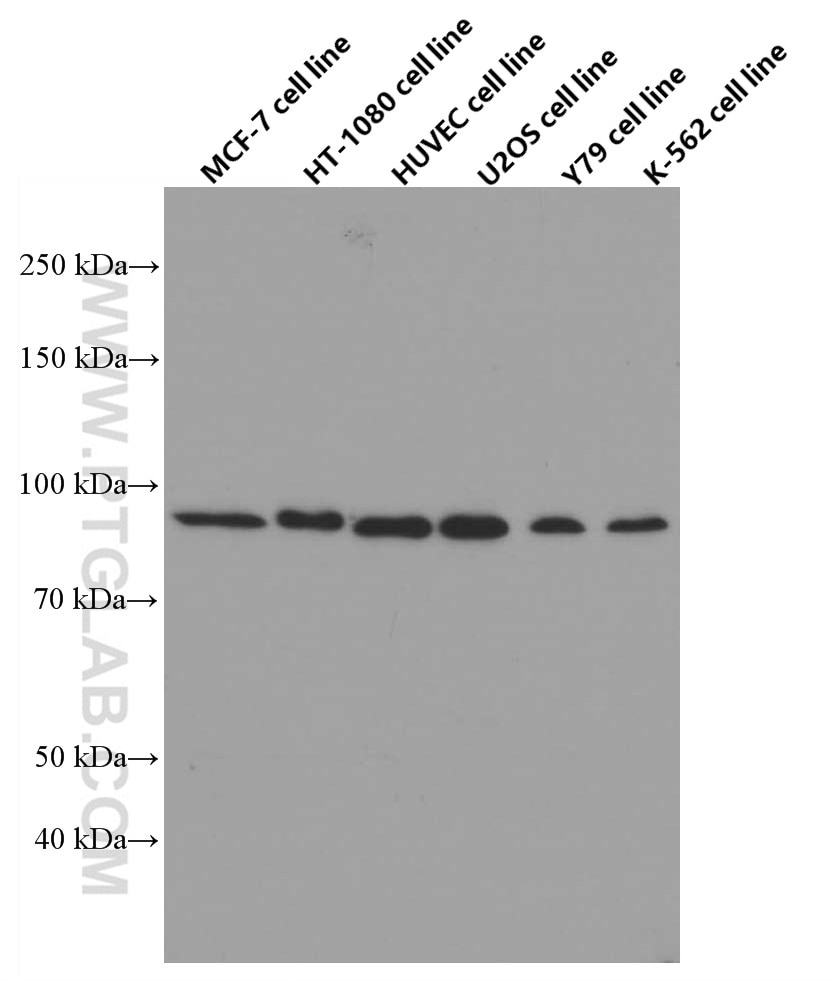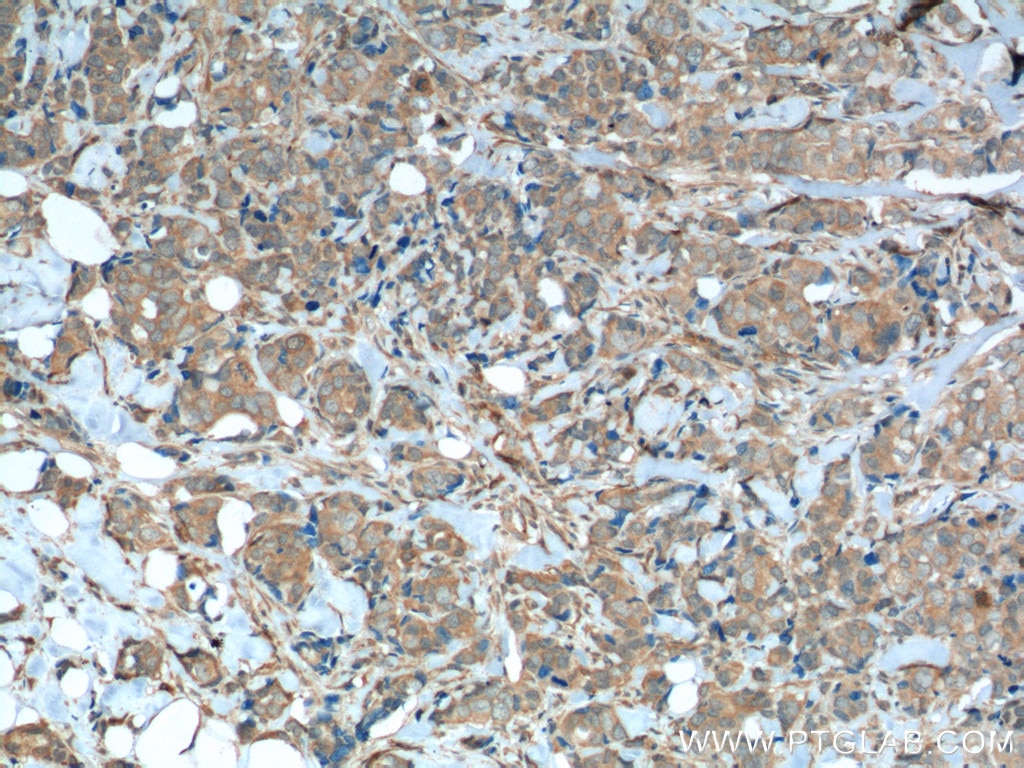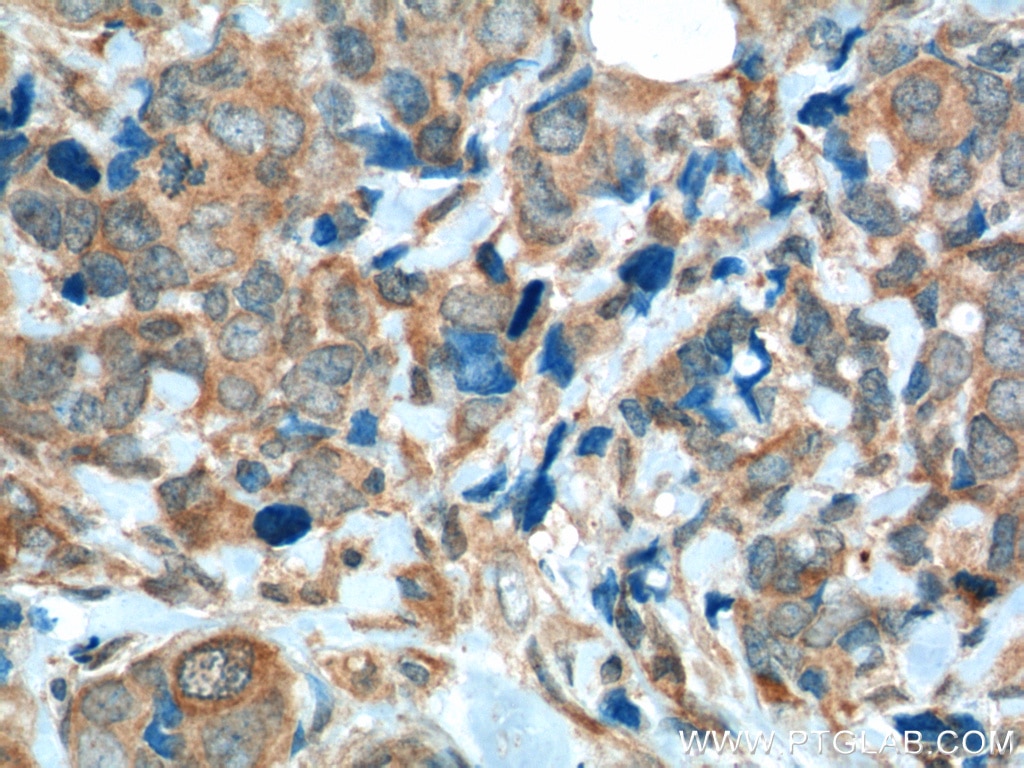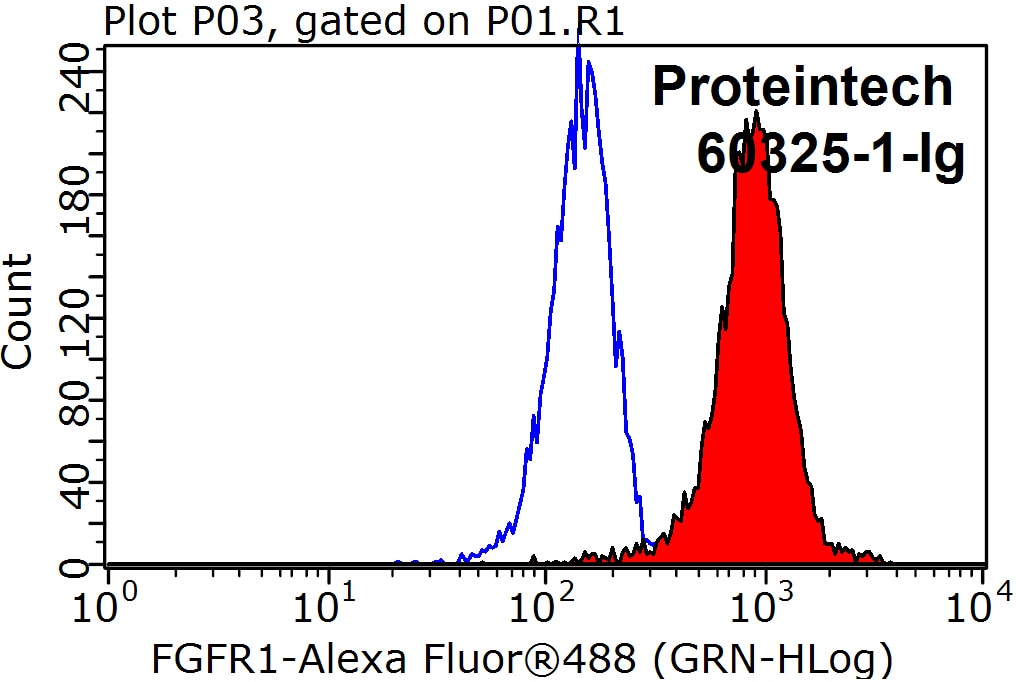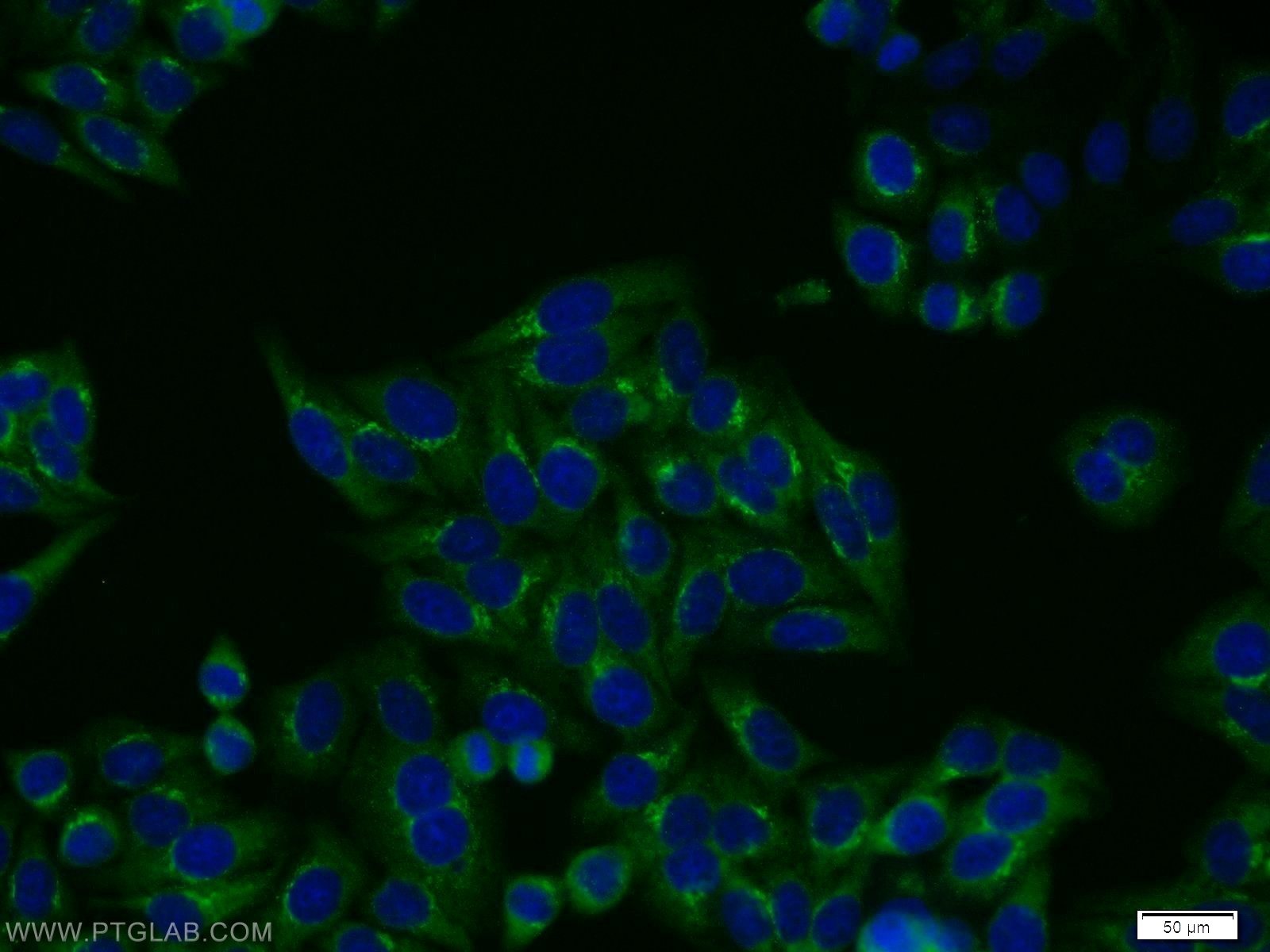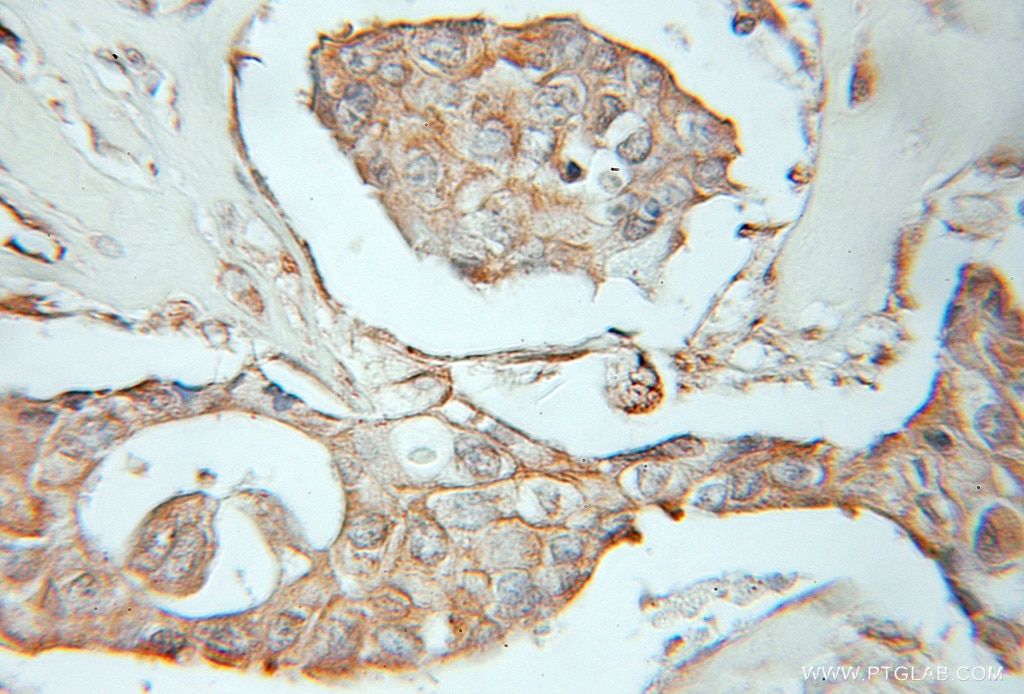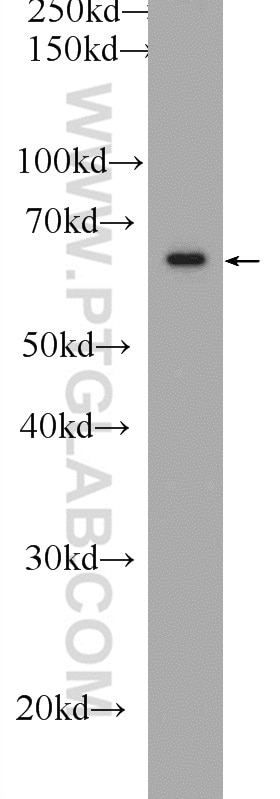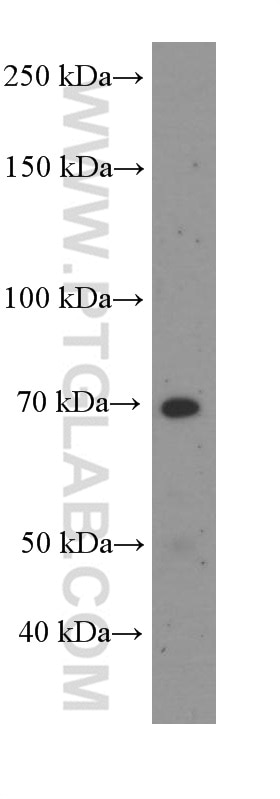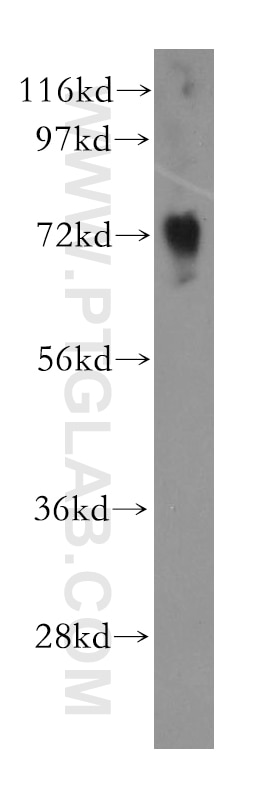Anticorps Monoclonal anti-FGFR1
FGFR1 Monoclonal Antibody for FC, IHC, WB, ELISA
Hôte / Isotype
Mouse / IgG2c
Réactivité testée
Humain
Applications
WB, IHC, IF, FC, ELISA
Conjugaison
Non conjugué
CloneNo.
10F12E7
N° de cat : 60325-1-Ig
Synonymes
Galerie de données de validation
Applications testées
| Résultats positifs en WB | cellules MCF-7, cellules HT-1080, cellules HUVEC, cellules K-562, cellules U2OS, cellules Y79 |
| Résultats positifs en IHC | tissu de cancer du sein humain il est suggéré de démasquer l'antigène avec un tampon de TE buffer pH 9.0; (*) À défaut, 'le démasquage de l'antigène peut être 'effectué avec un tampon citrate pH 6,0. |
| Résultats positifs en cytométrie | cellules K-562 |
Dilution recommandée
| Application | Dilution |
|---|---|
| Western Blot (WB) | WB : 1:1000-1:3000 |
| Immunohistochimie (IHC) | IHC : 1:50-1:500 |
| Flow Cytometry (FC) | FC : 0.20 ug per 10^6 cells in a 100 µl suspension |
| It is recommended that this reagent should be titrated in each testing system to obtain optimal results. | |
| Sample-dependent, check data in validation data gallery | |
Applications publiées
| WB | See 23 publications below |
| IHC | See 5 publications below |
| IF | See 2 publications below |
Informations sur le produit
60325-1-Ig cible FGFR1 dans les applications de WB, IHC, IF, FC, ELISA et montre une réactivité avec des échantillons Humain
| Réactivité | Humain |
| Réactivité citée | Humain |
| Hôte / Isotype | Mouse / IgG2c |
| Clonalité | Monoclonal |
| Type | Anticorps |
| Immunogène | FGFR1 Protéine recombinante Ag3646 |
| Nom complet | fibroblast growth factor receptor 1 |
| Masse moléculaire calculée | 820 aa, 91 kDa |
| Poids moléculaire observé | 91 kDa |
| Numéro d’acquisition GenBank | BC018128 |
| Symbole du gène | FGFR1 |
| Identification du gène (NCBI) | 2260 |
| Conjugaison | Non conjugué |
| Forme | Liquide |
| Méthode de purification | Purification par protéine A |
| Tampon de stockage | PBS avec azoture de sodium à 0,02 % et glycérol à 50 % pH 7,3 |
| Conditions de stockage | Stocker à -20°C. Stable pendant un an après l'expédition. L'aliquotage n'est pas nécessaire pour le stockage à -20oC Les 20ul contiennent 0,1% de BSA. |
Informations générales
Fibroblast growth factor receptor 1 (FGFR1) is a tyrosine-protein kinase that acts as a cell-surface receptor for fibroblast growth factors. FGFR1 has been implicated in diverse biological processes including embryonic development, cell proliferation, differentiation, migration, and tumorigenesis. Mutations in the FGFR1 gene have been associated with Pfeiffer syndrome, Jackson-Weiss syndrome, Antley-Bixler syndrome, osteoglophonic dysplasia, squamous cell lung cancer, and autosomal dominant Kallmann syndrome. Alternatively spliced variants that encode different protein isoforms have been described.
Protocole
| Product Specific Protocols | |
|---|---|
| WB protocol for FGFR1 antibody 60325-1-Ig | Download protocol |
| IHC protocol for FGFR1 antibody 60325-1-Ig | Download protocol |
| FC protocol for FGFR1 antibody 60325-1-Ig | Download protocol |
| Standard Protocols | |
|---|---|
| Click here to view our Standard Protocols |
Publications
| Species | Application | Title |
|---|---|---|
Nat Commun Interactome analysis reveals that lncRNA HULC promotes aerobic glycolysis through LDHA and PKM2. | ||
Theranostics Blockade of phosphotyrosine pathways suggesting SH2 superbinder as a novel therapy for pulmonary fibrosis. | ||
J Transl Med A novel intronic circular RNA circFGFR1int2 up-regulates FGFR1 by recruiting transcriptional activators P65/FUS and suppressing miR-4687-5p to promote prostate cancer progression | ||
Oxid Med Cell Longev DJ-1/FGFR-1 Signaling Pathway Contributes to Sorafenib Resistance in Hepatocellular Carcinoma. | ||
Int J Mol Sci The FGFR Family Inhibitor AZD4547 Exerts an Antitumor Effect in Ovarian Cancer Cells. | ||
J Cell Physiol Brivanib, a multitargeted small-molecule tyrosine kinase inhibitor, suppresses laser-induced CNV in a mouse model of neovascular AMD. |
